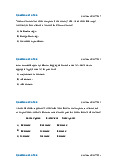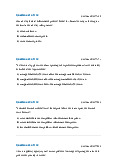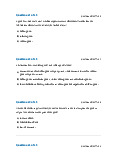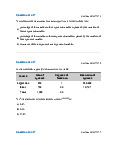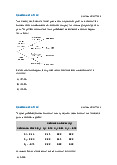















Preview text:
Unit 1 Lifestyle Opener Extra activity
1 ★ CPT extra! Photo activity [before Ex.1]
Ask students to work in pairs to decide which activities
you (their teacher) often do and which you rarely or never
do. Then do a live listening (see explanation below).
Briefly describe the activities you often do. Find out which
students predicted your answers correctly.
Note: A ‘live listening’ is when you talk naturally about a
topic and students listen to you with a task to do. It’s both
fun and motivating for students at this level to listen to
Students’ own answers. The photo shows a man in
and follow a native or proficient speaker, and a welcome
Bukhansan National Park. The park contains forested
and real change from listening to recorded material.
areas, temples and granite peaks, and the man has clearly
just climbed up one of the peaks. Maybe he feels relaxed or tired after a long climb. Teacher development
Using mime or visuals to check words 2 [1]
At pre-intermediate level, most new words can be
explained with a picture or a mime. Here are four
suggestions for checking the meaning of the activities in Exercise 3:
print off or cut out pictures to make flashcards, or you
could use your classroom technology to project pictures 1 In Seoul, South Korea
you have found online. Start by showing the pictures 2 About ten million
and asking: What can you see? Alternatively, since 3 It’s a good way to relax.
these are activities, ask: What are they doing? Elicit
ideas from students. At the end, ask students to look
at the activities in Exercise 3 and match them with your Audioscript [1] pictures.
try to elicit the words. Once you have shown all
your pictures, ask students to work in pairs to try to
remember what activities they saw. Brainstorm activities
to the board in feedback. Then ask students to look
at the activities in Exercise 3 and say which ones they remembered.
playing a violin, reading a book) and ask students to call
out, write down or silently remember the activities you
The Bukhansan National Park covers an area of
are miming. At the end, students match what they said,
79.92km2 and was established on 2 April 1983. Bukhansan
wrote or remembered with the phrases in Exercise 3.
means ‘mountains north of the Han River’. It has three
main peaks and is so popular with hikers that trails are
six of them, telling students to tick the ones they see
closed on a rotational basis to protect the environment.
you act out. Let students check in pairs, then improvise
their own mimes to show the meaning of the other 3 phrases.
Note that the answers here depend on the students’ own experience. I go jogging every morning.
I don’t often go clubbing. 21 1a How well do you sleep? and stressed.
should read a text naturally the first time they read it, Lesson at a glance
and that they should not worry about unknown words. 3 Vocabulary everyday routines
1 ★ CPT extra! Vocabulary activity [after Ex. 1] adverbsof frequency 4 1 2 3 4 5 6 7 8 9 10 g f h a d e c b j i 1 2 b a 5 Vocabulary note
The main thing to point out here is the specific collocation
of verbs and nouns or adverbs in ways that may not directly
translate into students’ L1, e.g. fall asleep and take a break. Reading 2 [2] 1 2 3 4 do we sleep spend don’t know do we have
5 don’t get 6 work 7 go 8 do we sleep 9 10 11 12 depends need don’t sleep take Grammar note
Note the following form rules that often cause students problems:
after o (he goes), after
y changes to i (she flies) and Students’ own answers
after the consonant sounds ch, sh, x and ss (she watches,
he washes, she fixes, he kisses). Students sometimes misapply rules and change y to i when y comes after Teacher development
a vowel. Words that end with vowel + y don’t change
Reading a text while listening to a recording
(e.g. play becomes plays not plaies).
Whether you choose to ask students to read with or
+ bare infinitive to form negatives (e.g.Tom doesn’t
without the recording is up to you. Here are some
watch TV). Students often confuse this in the third person
reasons why it’s a good idea to ask students at the pre-
(e.g.He don’t watch/watches; He doesn’t watches.)
intermediate level to listen and read: Q word auxiliary subject main verb whole class activity. Where do you live?
speaker uses stress, intonation and pauses can help What does she do?
students follow a text more easily. 22 Unit 1 Lifestyle UNIT 1 Lifestyle 7 1
1 doesn’t live 2 drives 3 Does; speak 4 don’t like 5 6 7 8 9 Do; see are don’t need Is has
Pronunciation /s/, /z/ or /ɪz/ 6a
[3] ★ CPT extra! Pronunciation activity [before Ex. 6] Students’ own answers 8 1 2 3 4 feels /z/ needs /z/ watches /ɪz/ sleeps /s/ 5 6 7 8 goes /z/ dances /ɪz/ does /z/ works /s/ 1 2 3 often sometimes never Pronunciation note
After a voiced sound, the third person ‘s’ is pronounced /z/. 9
After an unvoiced sound, it’s pronounced /s/.
When a verb ends in the following sibilant sounds, the third
person ‘s’ or ‘es’ is pronounced /ɪz/: /s/, /z/, /dʒ/, /ʃ/ or /tʃ/.
Note that a voiced sound is a sound made when the voice
box vibrates and an unvoiced sound is a sound made
when the voice box doesn’t vibrate. Say /t/ and /s/ with
your hands over your ears and notice the lack of a deep
vibration. Then say /d/ and /z/ and notice the different vibrating sound.
A sibilant is a hissing /s/-like sound (a sound the phonemes
1 after the verb to be, before the main verb listed above all share). 2 at the beginning b [3] 2
1 I am often tired at work.
2 We eat out in a restaurant twice a week. / Twice a week we eat out in a restaurant.
Students at this level often forget to add the -s or -es 3 correct
ending. Encourage them to use phonemes when noting 4 correct
new verbs in their dictionary (e.g. watch – watches /ɪz/,
5 I have a cup of coffee two or three times a day. / Two or
play – plays /z/). Many teachers keep three small flashcards
three times a day, I have a cup of coffee.
with the phonemes /s/, /z/ and /ɪz/, which they show when
6 They don’t often play board games.
students make mistakes. You could pin them next to the
7 Does she usually take public transport?
board and just point in their direction when students
make the common slip of omitting this ending. 3 1 2 3 4 5 6
always get up never have often meet
7 go 8 every day 9 eat 10 two or three times a month
1a How well do you sleep? 23 UNIT 1 Lifestyle
10 ★ CPT extra! Grammar activity [after Ex. 10] 12 A: Every week B: Once a month
1 My brother always plays tennis on Saturday mornings. C: Once a year
2 We eat out at a restaurant about once a month. / About
once a month, we eat out at a restaurant.
3 I take a bus to school every day. / Every day, I take a bus to school.
4 She is rarely at home in the middle of the day.
5 They go on holiday twice a year. / Twice a year, they go on holiday.
6 Are you often late for work?
Here are some possible questions:
Sport: Do you often do exercise / do sport / watch football Grammar note
live or on TV? How often do you go to the gym?
Free time: How often do you go to the theatre /
Adverbs of frequency generally go between the subject
and main verb (I often sleep), but after the verb be and clubbing / out?
auxiliary verbs (He is often asleep; He doesn’t often sleep).
Food: Do you often cook dinner? How often do you eat
The adverb sometimes is more flexible – it’s often used at
Indian / Chinese / Italian food?
the start of sentences (Sometimes we go camping in the
Work: Are you often late for work? How often do you summer).
work in the evening / at weekends?
Expressions of frequency can be placed at the start of
Home: Do you often do the housework? How often do
sentences to add emphasis, but generally they go at the end. you do the ironing? Speaking my life 13 11
You could turn this into a class survey. Each student walks
round the class and interviews as many students as they
can in five minutes. Then they sit with their group and
compare their information. They can then produce a
report based on the information they share. You could ask
students to write the report for homework.
Here are some example questions and responses:
How often are you late for college? Never. / About once aweek.
How often do you check your emails? Twice a day
How often do you go on holiday? Every summer / Twice ayear.
How often are you stressed at work? Often. / Every day. 24 Unit 1 Lifestyle UNIT 1 Lifestyle ANSWERS The secrets of a long life
Do: gardening, (regular) exercise Go: fishing, cycling, swimming Lesson at a glance Play: games Reading 1
Do: homework, nothing, yoga, karate (aerobics, athletics)
Go: hiking, running, shopping, surfing (camping, dancing)
Play: cards, tennis, the piano, football (chess, basketball) Vocabulary note Sport 1 In Japan
There are basic rules with play, do and go (although there
2 It has some of the oldest people in the world. are some exceptions). 3 fish, fruit, vegetables 4 Students’ own answers
something similar), e.g. play football, tennis, golf,
rugby, ice hockey, badminton.
swimming, skiing, fishing. Background information
Okinawa Island has an area of over 1,200 square
e.g. do aerobics, gymnastics, athletics, martial arts.
kilometres and is roughly 640 kilometres south of the rest
We tend to say do sport (not play sport) and do boxing or
of Japan. It’s famous for thick, slimy Mozuku seaweed
wrestling (not go boxing).
(shown in the photo) which is very healthy, and one reason
why the islanders live so long. Instruments
In common with many other European languages, we also
The oldest person who ever lived was French woman
Jeanne Calment (1875–1997), who lived to the age of
use play with musical instruments, but we usually use the,
e.g. play the guitar, play the drums, play the violin.
122years, 164 days. The oldest Okinawan was Kama
Chinen (1895–2010) who lived to be 114 years 124 days old. Uses of do
We use do with activities with the when there's an idea
Wordbuilding collocations with
of work, e.g. do the shopping, do the gardening, do the
housework. We also use do when we don’t specify the
do,play andgo
activity, e.g. do nothing, do something fun, not do much. 3 5
1b The secrets of a long life 25 UNIT 1 Lifestyle ANSWERS 6 [5]
1 T (He’s currently travelling to different places around the world.)
2 F (At the moment he’s working on the island of
Sardinia in Italy and he’s speaking to us right now on the phone.)
3 F (Sardinia is an interesting place because men live to the same age as women.)
4 T (Every Sunday the whole family eats a big meal together.)
1 the age of men and women (men live to the same age 5 F (He doesn’t say that.) as women)
6 T (… the younger generation are eating more food
2 family life (the family is so important here)
like chips and burgers. Also young people are
4 food (Every Sunday, the whole family eats a big meal
moving to the city, so they are doing less exercise
together; eating more food like chips and burgers)
because of their lifestyle.)
5 exercise (doing less exercise) 8 Audioscript [5]
Sardinia (/sɑːˈdɪni /
ə ) lies to the west of the Italian
mainland, south of Corsica (which belongs to France), in
the Mediterranean Sea. It has a population of 1.6 million.
It’s noted for its wild mountainous interior, and the beauty
of the sea and coasts, with clear water and silver beaches.
The capital is Cagliari in the south; the other main city
is Sassari in the north west. Outside of these cities, most
people live a rural life in small villages. Grammar present simple and presentcontinuous
9 ★ CPT extra! Grammar activity [before Ex. 9]
Sentences 3 and 4 use the present simple tense because
they talk about things that are always or generally true (3)
and routines and habits (4). Note the use of Every Sunday,
which tells us this is a regular routine. 10 26 Unit 1 Lifestyle UNIT 1 Lifestyle 12
You form the present continuous tense with the present
simple of the verb to be + -ing form (present participle) of the main verb. Grammar note
The examples in the grammar box and the sentences in
Exercise 9 illustrate some of the spelling rules for the -ing 1 2 3 4
form. You may wish to point these out to students.
’re learning spend ’m checking do; go 5 6
’m reading isn’t eating 7 don’t do 8 are playing
double the last letter of the verb and add -ing,
e.g.travel S travelling.
He’s currently travelling to different places around the world. Grammar note
1 something happening around now, but not necessarily
e.g.move S moving. at this exact moment
Young people are moving to the city. 2 a habit or routine
You could also point out that we do not use continuous
3 something in progress now
forms with stative verbs, e.g. like, love, be, have. So we
4 asking about a habit or routine
would not say: I am liking my English classes a lot at the
moment. Instead we would use an active verb such as
5 something happening around now, but not necessarily
enjoy, e.g. I am enjoying my English classes at themoment. at this exact moment
6 something happening around now, but not necessarily at this exact moment 11
7 generally or always true
8 a changing situation (Students may argue that we can
use the present simple in sentence 8. This is correct if
you see this as a general truth as opposed to a changing situation.) Speaking my life 13
Sentence 1: b (to talk about something happening around
now, but not necessarily at this exact moment)
Sentence 2: c (to talk about something actually in progress now)
Sentence 5: a (to talk about a changing situation) Grammar note
The present continuous is used to show that something 1 a
How do you usually spend your free time?
is temporary, has duration and is around now. It can be
b Are you doing much sport these days? shown with a timeline: 2 a Do you often read novels?
b Are you reading any good books at the moment? 3 a
Where do you normally go on holiday? Past Now Future
b Where are you planning to go this year? 4 a
Do you speak any other languages?
b Are you learning any new languages? 14 4 1 2 3
'm waiting are; going isn’t working
4 ’m writing 5 ’s talking 6 're building 7 are becoming 5 1 2 3
'm eating; eat drives; 's driving 's talking; talk 4 5 'm working; work 'm doing; do 6 1 2 3 4 5 6
live eat say is is changing are eating
1b The secrets of a long life 27 UNIT 1 Lifestyle 1c Nature is good for you
With a young class, you could turn this into a roleplay. Ask
half the class, working in pairs, to prepare questions to ask
somebody famous or in the news. Ask the other half to Lesson at a glance
decide which person to be and to think about what they
often do and what they are doing these days. Organize
students into new pairs (one from each half) to carry out their interviews. Reading 1 Students’ own answers.
The woman is enjoying a virtual reality nature experience.
She’s standing in a studio with pictures of nature around her. Vocabulary note
brain = the grey organ in your head that thinks
heart rate = how fast your heart beats outdoors = not inside
nature = the world not made by man, i.e. trees, lakes, mountains, seas
3D virtual reality = 3D means three-dimensional – virtual
and reality refers to the pictures and sounds made by a
computer to make the user feel they are in a real place 2 [6] a c 1 b 3 2
3 ★ CPT extra! Grammar activity [after Ex. 3] 28 Unit 1 Lifestyle UNIT 1 Lifestyle
Critical thinking giving examples ANSWERS 7 1 It’s good for us.
2 Humans are spending more time inside and less time outside.
3 The number of visitors is getting lower every year. 4 in a 3D virtual reality room 5 near parks 6 Sentence b has the main idea.
a new shopping mall with a large garden 7
Sentences a and c give examples. in forest schools 8 13 million
8 ★ CPT extra! Critical thinking activity [after Ex. 8] Word focus feel 4 Paragraph 2 Main sentence: 1 2 3
feel better feel like going feel that
As a result, some doctors are studying the connection between nature and health … Example sentences: Vocabulary note
One example of this is the work of Dr Matilda van den Bosch in Sweden.
1 To talk about your emotions or health: feel better/
worse, feel tired, feel ill, feel sick, feel bored, feel under
Another good example of how nature is good for health the weather comes from Canada.
2 To talk about wanting to do something: I feel like going Paragraph 3
out later; I feel like singing. Main sentence:
3 To talk about an opinion: I feel (that) …
Because of studies like these, some countries and cities
want nature to be part of people’s everyday life. 5 Example sentences:
In Dubai, for example, there are plans for a new shopping mall with a large garden …
In some countries such as Switzerland, ‘forest schools’ are popular …
And South Korea is another good example; it has new forests near its cities … 1 2 3 like that better 6 Vocabulary note
We can use For example, to introduce an example, or one
of a number of other set phrases:
An/One example (of this) is …
Another / A further / A good example (of this) is …
Alternatively, we can use a phrase at the end of sentences:
The number of visitors is going down, for example.
Write the following sentence starters on the board. Ask
The reduction in the number of visitors is an example
students to complete them, then discuss them in pairs or of this. small groups:
We use such as + noun / noun phrase to give an example.
1 I feel that the government …
In cities such as London, …
2 I often feel tired when …
3 At the weekend, I usually feel … because …
4 … always makes me feel …
5 Right now, I feel like …
1c Nature is good for you 29 UNIT 1 Lifestyle 9 12
In groups or open class, ask students to give examples
of how their home city has changed to be healthier and
more natural in their lifetimes. Alternatively, you could ask
students to prepare and give a presentation on this topic.
The preparation could be done for homework.
Students’ own answers. Some suggestions:
1 I relax in my free time in different ways. For example,
Isometimes go out with friends, but sometimes I stay at home and watch TV.
2 My home town has some places with trees and nature,
such as the park in the city centre, and the national zoo.
3 There are some beautiful national parks in my country.
A good example is Millennium Park. Extra activity
Write the following on the board and ask students to
personalize them with examples:
We have great beaches in my country.
There are a lot of things to see in my city. Speaking my life 10
Students’ own answers. Some possibilities include: install
an open-air gym in the park; build an outdoor swimming
pool, provide an all-weather football pitch. 11 30 Unit 1 Lifestyle UNIT 1 Lifestyle
Pronunciation one or two syllables? At the doctor’s 3a [7] Lesson at a glance Vocabulary medical problems
1 ★ CPT extra! Lead-in activity [before Ex. 1] 1 2 3 4 5 6 7 8 b c g a h f d e
Note the difficult pronunciation of some of these words:
ache /eɪk/, ear /ɪə/, stomach /ˈstʌm k ə /, sore /sɔː/, throat /θrəʊt/, cough /kɒf/. Vocabulary note
Note that the main stress is on the adjectives in the
compound nouns: sore throat, runny nose, bad cough. Note the fixed collocations:
Note that the main stress is on the first syllable in
a runny nose (= you can’t stop ‘fluid’ coming out of it)
compounds with ache: headache, stomach ache.
a sore throat (= it hurts when you swallow)
We use ache (= a pain) with various parts of the body
(note also toothache). We always say a headache, but
Real life talking about illness
usually don’t use the article with other ‘aches’. 4 [8] 2
Conversation 1: a runny nose and a sore throat
1 I go to bed: headache, stomach ache, a temperature
Conversation 2: earache and temperature (perhaps backache)
2 I take medicine or pills: headache (paracetamol,
aspirin); earache (ear drops); stomach ache; sore throat Audioscript [8]
(throat sweets / lozenges); bad cough (cough syrup)
3 I go to the pharmacy or see my doctor: you might go Conversation 1
to the pharmacy for all these – backache, earache, very
bad stomach ache, and perhaps a high temperature
might mean going to see the doctor. 1d At the doctor’s 31 UNIT 1 Lifestyle Pronunciation note
When giving strong advice, the intonation starts high, then rises, then falls:
You should take this medicine. 7
Ask students to prepare and practise another dialogue
between a doctor and patient using different vocabulary.
You could ask pairs to record their dialogue and listen
back to it critically, or ask them to perform their dialogue
in front of another pair, and ask for feedback on their accuracy and pronunciation. a c e 1 b 2 1 d 2 1 6 1 2 3 4 5 6 7 8 9 g a e f b c h i d 32 Unit 1 Lifestyle UNIT 1 Lifestyle 4 1e Personal information Lesson at a glance Writing filling in a form
first name, middle name, surname, title, age, gender,
date of birth, address, postcode, telephone number, email 1
address, contact details of person in case of emergency
nationality, first language, level of English
needs, interests, length of stay Students’ own answers 5
Some possible types of form: registration form at school,
college or university, job application form, passport or visa application form
Information often on forms: first name, middle name,
surname, title, age, gender, date of birth, address,
postcode, telephone number, email address
Once the class have agreed on a ‘perfect’ form, ask 2
students to write up and complete the form with personal
information. They could do this for homework.
A medical form and a visa application form
Writing skill information on forms 3a 1 Marital status 2 Current medications 3 No. of dependents 4 Country of origin 5 Place of birth
6 Contact details of person in case of emergency 7 Middle initial
b ★ CPT extra! Writing activity [after Ex. 3] 1e Personal information 33 UNIT 1 Lifestyle
Here are some other things you can do to use National 1f My local park
Geographic photos usefully:
Book online. Find them and project them using your Before you watch
classroom technology. This way you can bring this stage
1 ★ CPT extra! Lead-in activity [before Ex. 1] of the lesson off the page.
don’t have to use the photos in the book. they feel?
images they come across in the lessons. Ask students to
describe other photos they find. Key vocabulary Students’ own answers. 2
Possible answers include: it’s free, it’s healthy, it’s a good
place to relax or do exercise, it’s nature in the middle of a
town or city, children can play there safely, it’s a nice place
for a picnic, you can feed the birds. Background information
Park Güell, located on the northern face of Carmel
Hill in Barcelona, was named after Eusebi Güell, the
entrepreneur who paid for the construction of the park.
It was largely designed by the famous architect Antoni
Gaudí, the face of Catalan modernism, who also designed 1 2 3 4 5 6
the Sagrada Família cathedral in Barcelona. The photo d b e a f c
shows Gaudí’s designs and mosaics on the steps up to
the main terrace. The park was built at the start of the
twentieth century. It provides great views of the city. Vocabulary note
Barcelona is the second largest city in Spain and the capital
no matter what = ‘no matter’ means ‘it’s not important’ of the region of Catalonia.
and can be combined with other words (no matter who/ when/where/whether, etc)
pram = an abbreviation of the old-fashioned word Teacher development
‘perambulator’, a pram is used to describe the four-
wheeled device used to carry babies when they are small
Using the photographs in Life
and lying down; when babies can sit up and face forward,
Life aims to use large, interesting photographs throughout
they are carried in a pushchair
each unit. Notably, there is a half-page photo on the
A walkway is used for a path that is man-made and has a
introductory page of each unit, large photos to go with
specific route with a destination
most reading and listening texts, and a full-page photo to
go with the video section. All these photographs are sourced
blossom = provide examples such as ‘apple blossom’
from National Geographic’s vast catalogue of images taken
(blossom is used as a verb to mean ‘grow as a person’
by some of the world’s greatest photographers (many of becomes ‘more confident’)
whom are referenced on the page with their photos). The
aim is for the photos to be both illustrative and informative.
They stimulate students’ interest in the theme and topics While you watch
and provide information that will be useful in their 3 [1.1]
understanding of texts that they read in the lesson.
ask questions such as What can you see? and What are
they doing? but also ask questions such as How does the
photo make you feel? Where did they take the photo?
What are the people in the photo thinking?
ask students to say what they expect to read or listen. 1 2 3 4 5 6 7 b a d e c f g
visual back-up to help you teach key words and phrases.
unit and to find out how well students can already use
them, design your lead-in questions to use the tenses or
grammar forms that have or will come up in the unit. 34 Unit 1 Lifestyle UNIT 1 Lifestyle After you watch 6 Student A:
1 often 2 weekend 3 2 4 every day 5 break 6 7 8 9 children happy every day sometimes 10 11 12 quite often twice every day Student B:
1 dogs 2 trees 3 high 4 house 5 road 6 pretty 7 8 9 10 11 seasons relaxing go exercise plants 12 13 flowers look at 1f My local park 35 UNIT 1 Lifestyle 5 UNIT 1 Review and memory
booster ★ CPT extra! Language games Memory Booster activities
Exercises 3, 6 and 8 are Memory Booster activities. For 1 2 3 4 relaxing asleep swimming ache
more information about these activities and how they benefit students, see page 10. 6 ❯❯ MB I can … tick boxes
As an alternative to students simply ticking the I can …
boxes, you could ask them to give themselves a score from
1 to 4 (1 = not very confident; 4 = very confident) for each
language area. If students score 1 or 2 for a language
area, refer them to additional practice activities in the
Workbook and Grammar summary exercises. Students’ own answers Grammar 1 Real life 7 1 2 3 4
How do well sore Have you got
1 works 2 he’s taking 3 They’re swimming 4 like 5 Try 6 should 5 6 doesn’t seem it feels 8 ❯❯ MB 2
1 She’s got backache. He’s got a headache. She’s got stomach ache.
2 Student’s own answers. Some possibilities include: She
1 I rarely play computer and video games.
should see a doctor. He should take an aspirin. She
2 We’re studying Spanish at the moment. / At the should go to bed.
moment, we’re studying Spanish.
3 My family does sport every weekend. / Every weekend, my family does sport.
4 All my friends are working these days. / These days all my friends are working. 3 ❯❯ MB 4 1 2
fall asleep take a break 3 work long hours 4 get up late 5 TV; watch 36 Unit 1 Lifestyle
